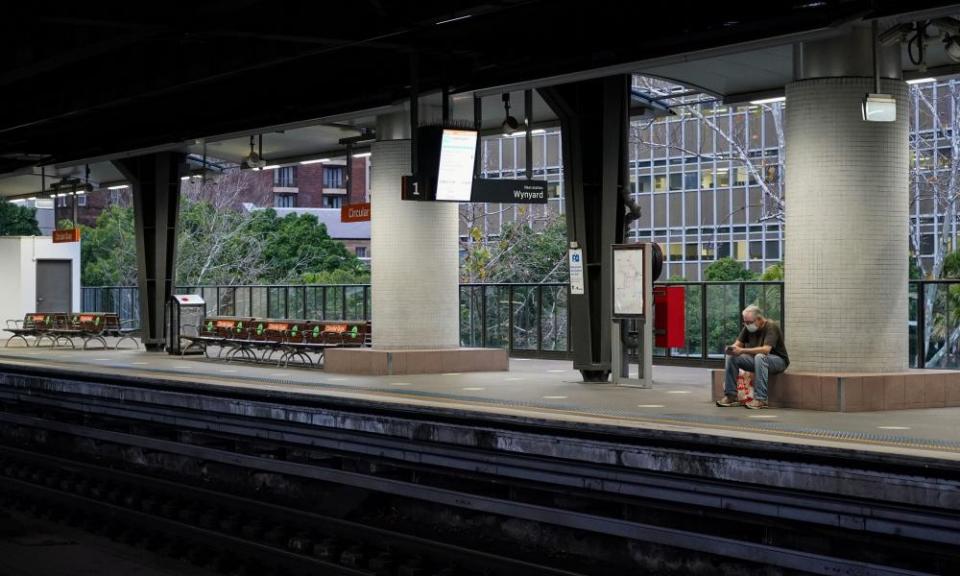Rule-breakers and anti-lockdown marchers are boofheads – but the biggest failure is the government’s

If state health laws allow places in Bondi to serve margaritas in open takeaway cups to a queuing throng during a pandemic, it stands to reason some people will call getting drunk while out walking essential “exercise”.
But if you make it illegal and let people know that, then they probably won’t do it. Because they’ll no longer be able to.
That’s the thing when it comes to the thorny balance between individual responsibility, liberty and state guidelines in a crisis: people need to be told firmly, unambiguously, from those in authority the precise rules and health advice – especially regarding vaccinations.
Amid the recent unholy scramble to vilify a number of individuals for transmitting (active voice) the virus (not least “patient zero”, an unvaccinated airport transport worker, and the removalist brothers with limited English whose mother subsequently died of Covid-19) it should be remembered that the biggest hiccups in fighting the disease have resulted from systemic federal and state government failures and errors.
This includes dramatic communications derelictions when it comes to clear vaccination advice. Who should take AstraZeneca is, perhaps, the greatest case in point. The federal government, its often absent communicator-in-chief being Scott Morrison, has in recent months advised us to get AZ if you are aged 50 or over … err, no, only if you are over 60, but do take it if you’re 40 or way younger – but only if your doctor agrees.
And just by the way we, the government, will indemnify doctors administering the AZ.
What message does the stated need for indemnity send to those of any age considering the AstraZeneca?
If a government had intended to undermine public confidence in the safety of a statistically-on-balance safe and efficient vaccine against the Delta variant, such garbled communication would do the trick.
Some marketing, eh, from a PM whose name is supposedly synonymous with it!
Yet this was apparently accidental. Some marketing, eh, from a PM whose name is supposedly synonymous with it!
The vaccine rollout itself has, perhaps, been the greatest systemic failure. Delta is spreading like wildfire through locked-down Sydney now because when the latest strain hit such a small number of people (now just 17% nationally) were fully vaccinated.
But good governments learn from their mistakes, right?
Last year, the saddest, cruellest human calamity associated with the virus were the 655 aged care deaths in Victoria. After the aged care royal commission’s report into the virus’s terrible carnage in the sector and a Commonwealth spend of $9 million in the Victorian institutions on Covid-preparedness and checks, this year brought another outbreak in Victorian aged care.
Another calamity was narrowly avoided. Yet the relevant minister had no idea how many nursing home staff or residents were vaccinated even though the Morrison government had vowed most vulnerable Australians would receive their inoculations by last Easter.
It was late June – by which time Sydney was already well and truly locked down due to the spread of Delta – when the federal government announced that aged care workers would have to get one vaccination … by mid-September. Why was this not done far earlier? We know the answer – the absence of available vaccines.
Now comes the revelation that frighteningly few of the 150,000 in-home carers of the elderly (some visit multiple private houses in a day) are actually vaccinated. Another system failure.
Meanwhile, the prime minister is having an apparent “on” phase when it comes to his on/off support of lockdowns, especially in Sydney; of course it’s hard to argue vaccination is the answer when you’ve needlessly frightened the punters off AstraZeneca and messed up the Pfizer order.
Add to all of this a federation whose national interest is eroding to the four colonial winds of narrow, sometimes petty, parochial self-interest much as it did a century ago in the face of the Spanish influenza. It is easy to fathom how the fear, confusion – and yes, white hot anger – among those who have been making necessary sacrifices while locked down – transmogrifies into a punitive sentiment against the politicians and their systems failures.
Still the quest endures in some quarters to vilify certain individuals, to blame them despite their complex and sometimes ambiguous circumstances.
Individuals have their responsibilities, of course. Overwhelmingly Australians are meeting them – courageously, inequitably, fearfully, frailly, stoically – in these terrible times. There will always be exceptions where governments deny liberties for utilitarian reasons: boofhead footballers and house parties or the stupidity and selfishness of thousands marching unmasked, without social distance, for supposed “freedom” that will further imperil us and compound the denial of liberty – and the high-profile bloviators who negligently support them.
The community health perils of state governments locking down too late have been demonstrated in Victoria (last year) and now, starkly, in New South Wales where initial hesitancy translates to another month inside. Victoria’s lockdowns have since been characterised by prudent, decisive speed and unambiguously harsh rules. Some of Sydney’s lockdown rules remain contrastingly opaque and ambiguous.
Scratch most Australians and you’ll find a conformist. Ingrained iconoclasm, individualism and innate anti-authoritarianism are about as characteristic as that mythical egalitarianism.
If lockdown rules enable some to get drunk on takeaway margaritas in the name of “exercise” they’ll go for it. If the rules don’t, they won’t.
No. Government systems failures, more than wilful individual disobedience, has been the biggest problem in this crisis so far.
Paul Daley is a columnist for Guardian Australia

 Yahoo News
Yahoo News 